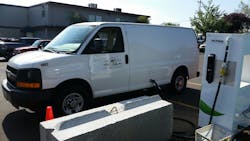Oregon City beverage fleet converts to propane autogas, cuts greenhouse gas emissions and more
Seven months after converting 10 cargo vans from gasoline to propane autogas, General Distributors, Inc. reports those vehicles have cut their greenhouse gas emissions by over 20 percent and saved an estimated $10,000 in fuel costs.
The company distributes beer, wine and non-alcoholic beverages to taverns, gas stations and grocery stores in 11 Oregon counties. General Distributors currently operates 50 cargo vans, 40 run on gasoline and the remaining 10 on propane autogas, each traveling 12,000 to 15,000 miles per year.
“Cost savings and longevity both influenced our decision to switch to propane,” said Don Lewis, CFO of General Distributors. “With the low cost of propane autogas, we’ll see payback from our conversion to propane<http://bluestargas.com/converting-your-fleet> in less than three years.”
Blue Star Gas, one of the region’s largest propane distributors, installed a 1,000-gallon on-site propane autogas fueling tank for the company and converted 10 Chevrolet Express one-ton cargo vans to propane autogas with Prins fuel systems. Blue Star Gas will assist with future propane autogas vehicle conversions and provide ongoing safety training and technical support.
According to Darren Engle, director of government relations for Blue Star Gas, adding more emission-reducing alternative fuels<http://bluestargas.com/green-gas> to Oregon fleets will help meet the state’s clean air goals.
“Although Oregon has made adopting cleaner alternative fuels a priority, companies need to ensure their decision makes good business sense,” said Engle. “Propane autogas offers low entry and infrastructure costs, a quick ROI and proven emissions reductions. It will continue to be a very competitive alternative fuel selection for Northwest fleets.”
Performance is another major factor that fleet managers consider. General Distributors was no exception, with drivers initially concerned about consistency in acceleration and power. “Despite some initial questions, our drivers reported no difference between the propane autogas-powered vehicles’ performance and the gasoline-fueled vehicles,” said Lewis. “There’s no loss in horsepower, we know it’s better for the environment, and we’re saving money.”
To learn more about propane autogas and vehicle conversions, visit bluestargas.com<http://bluestargas.com/green-gas>.
